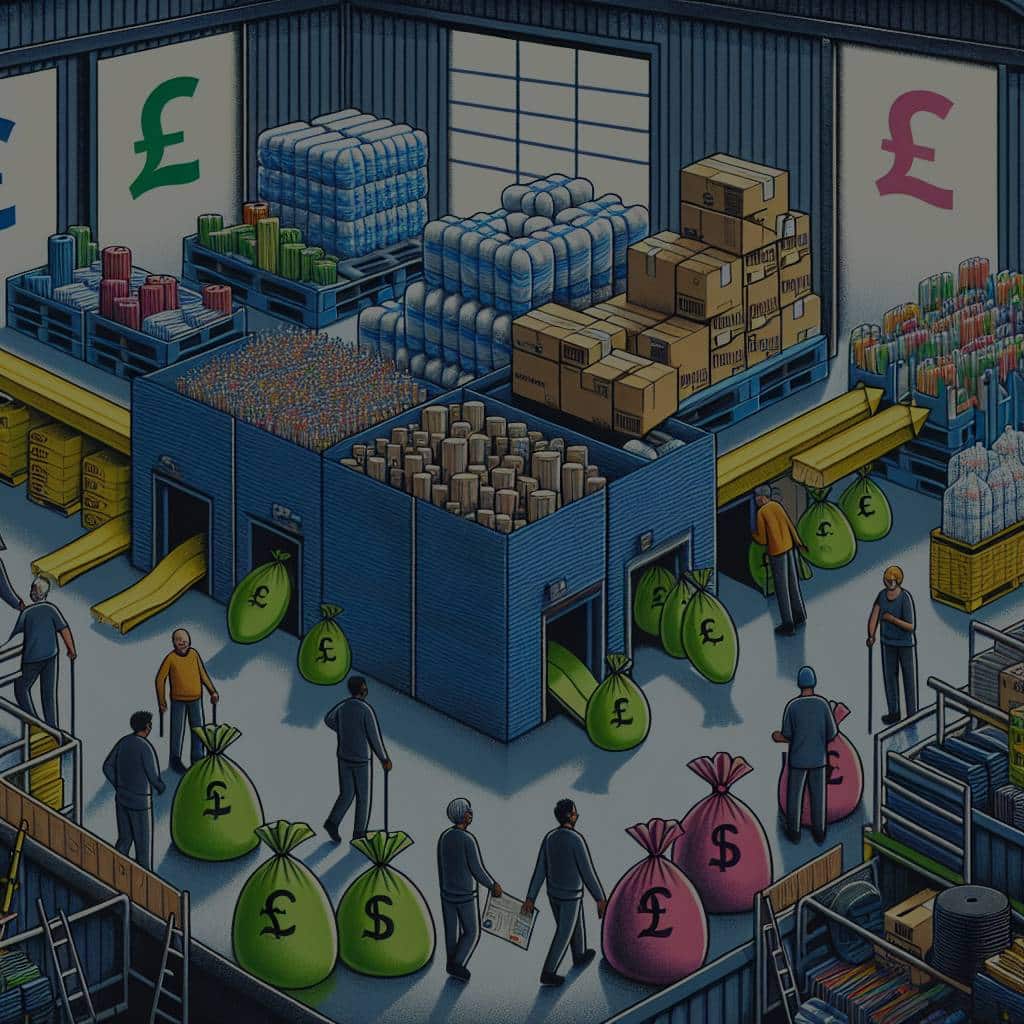What Are the Implications of the UK Plastic Tax for the Packaging Industry?

In the face of escalating climate change and environmental concerns, the UK government has taken a bold step toward curbing the recklessness of the packaging industry. It’s a move that has sent ripples across the business world. We’re talking about the newly introduced plastic tax. As businesses, you may be wondering what this means for your operations, your products and your bottom line. This in-depth article will explore what the new plastic tax is, its impact on packaging businesses, and how enterprises can navigate this new terrain.
Understanding the UK Plastic Tax
The UK government has set a worldwide precedent by introducing a plastic packaging tax (PPT). The HMRC will administer this tax, and it is specifically designed to encourage the use of recycled plastics in the production of plastic packaging. It’s a critical time for businesses to understand the mechanics of this tax and adjust their operations accordingly.
Have you seen this : What Are the Best Content Marketing Strategies for UK Luxury Brands?
The tax is applicable to plastic packaging products manufactured in or imported into the UK. It includes all forms of plastic packaging unless they contain at least 30% recycled plastic. Businesses that manufacture or import less than 10 tonnes of plastic packaging in a 12-month period are exempt from this tax. The rate is set at £200 per tonne of plastic packaging which doesn’t meet the required minimum recycled plastic content.
The Impact on the Packaging Business
There’s no doubt that the introduction of the PPT will have significant implications for businesses in the packaging industry. The tax is designed to force a shift towards more responsible, sustainable practices. But what does this mean in practical terms?
Also to read : How Can UK Companies Integrate Circular Economy Principles in Their Operations?
Firstly, the tax creates an additional cost for businesses producing or importing plastic packaging with a recycled content of less than 30%. This will directly affect the bottom line of businesses, with a knock-on effect on the price of goods. It is anticipated that these increased costs will be passed onto consumers, leading to higher prices for goods packaged in non-recycled plastic.
Secondly, businesses will need to review their supply chains. This includes scrutinising the components used in packaging and considering potential alternatives. Those who fail to adapt will find themselves hit with additional tax, potentially damaging their competitiveness in the marketplace.
Lastly, the tax will also create an administrative burden for businesses. HMRC has set out detailed record-keeping requirements for those liable to the tax. Compliance will require careful management and could result in increased overheads for businesses.
Preparing for the Plastic Tax
The introduction of the plastic tax is undeniably a substantial shift for the packaging industry. Businesses will need to adapt to this changing landscape. But how can businesses prepare effectively for the plastic tax?
Firstly, it’s essential to audit your current packaging. This means understanding the content of your packaging – how much is made from recycled plastic, and how much is non-recycled. This will help you to understand your current position and the potential tax liability your business faces.
Next, consider alternatives to non-recycled plastic. This might involve looking at innovative packaging options on the market, or working with your suppliers to increase the recycled content in your packaging. There’s a range of grants and funding available from the UK government to help businesses transition towards more sustainable practices.
Finally, businesses should ensure that they have robust systems in place to demonstrate compliance with the new tax. This involves keeping detailed records of the plastic packaging they manufacture or import, and the recycled content of this packaging.
The Role of Recycling
Recycling plays a pivotal role in the new plastic tax. The government’s aim is to boost recycling and reduce waste. This tax pushes businesses to shift their focus towards more sustainable, recyclable materials.
Reducing plastic waste starts with increasing the use of recycled content in packaging. Businesses that work towards this goal will not only escape the tax, but they will also contribute positively to the environment. The plastic tax is, therefore, an opportunity for businesses to do their part in mitigating the impact of plastic waste on the environment.
Moreover, the tax could lead to an increase in demand for recycled plastics, providing a boost to the recycling industry. This will create a circular economy, where plastic waste is turned back into usable packaging, reducing reliance on raw materials and reducing environmental impact.
In conclusion, the introduction of the UK’s plastic tax presents both challenges and opportunities for the packaging industry. While it may require some adjustment, it also offers the prospect of a more sustainable and environmentally friendly future.
Potential Opportunities for the Packaging Industry
While the plastic tax may seem like a daunting prospect for the packaging industry, it’s not all doom and gloom. There are potential opportunities for businesses willing to adapt and innovate.
For one, the tax opens up a new market for recycled plastics. As businesses scramble to avoid the tax, demand for recycled plastic is likely to rise. This presents an opportunity for businesses to diversify their product offerings and tap into this emerging market.
Secondly, businesses that manage to make the transition successfully will have a competitive advantage. They will be able to market their products as sustainable and tax-free, which is increasingly appealing to eco-conscious consumers.
Finally, this tax represents an opportunity for businesses to align themselves with the growing global trend towards sustainability. By embracing the change and demonstrating a commitment to the environment, businesses can boost their reputation and build goodwill with their customers.
The Plastic Packaging Tax and the Global Supply Chain
Every business is part of a supply chain, whether it is manufacturing, importing or distributing goods. The introduction of the UK plastic tax is expected to have significant effects on the supply chain of packaging businesses. The ripple effects of this tax will be felt by businesses worldwide as it impacts the supply and demand of plastic packaging and recycled plastic alike.
From a manufacturing standpoint, businesses producing plastic packaging without the minimum requisite of 30% recycled content will be hit the hardest. In anticipation of this tax, many manufacturers have started reassessing their operations, exploring options to replace non-recycled plastic with recycled plastic in their packaging. This might involve re-tooling production lines or even significant investments in new machinery, which could be a substantial modification for companies.
Importers and distributors will likewise need to adapt. Importers of plastic packaging will need to ensure that the packaging they import meets the required standards or be willing to pay the tax. For distributors, a key consideration will be whether their customers – retailers and other businesses – are willing to bear the increased costs resulting from the tax. If not, they may need to look for alternative, tax-compliant packaging suppliers.
The plastic tax will also have an indirect impact on the raw materials market. The increased demand for recycled plastic could drive up its price, while the reduced demand for non-recycled plastic could decrease its price.
All these changes require companies to adapt their supply chains, which could be a complex and time-consuming process. Therefore, businesses need to act now if they haven’t started already.
A Greener Future: The Plastic Tax and Reduction of Plastic Pollution
The plastic tax is not just a financial measure; it’s also an environmental one. The UK government has introduced this tax to reduce plastic pollution, one of the most pressing environmental issues of our time. By taxing non-recycled plastic packaging, the government aims to discourage its use and encourage the use of recycled content instead.
Plastic pollution has devastating impacts on the environment. It’s harmful to wildlife, contributes to greenhouse gas emissions, and can take hundreds of years to decompose. This tax is thus a critical step in tackling this issue and promoting a more sustainable future.
Encouragingly, the move towards recycled plastic doesn’t just reduce plastic waste – it also has other environmental benefits. The process of recycling plastic uses less energy and produces fewer emissions compared to making new plastic. Therefore, by using more recycled plastic, businesses can reduce their carbon footprint.
While the plastic tax may initially be a challenge for businesses, it’s ultimately a step in the right direction. The tax will drive the use of recycled content, reducing plastic waste, and helping to mitigate the impacts of plastic pollution. With careful planning, businesses can successfully navigate this change and play their part in creating a greener future.
Conclusion
The UK plastic tax is a bold and critical move towards a more sustainable future. While it may pose short-term challenges for businesses in the packaging industry, it also provides them with long-term opportunities. Businesses that are proactive and adapt to this change can gain a competitive advantage, tap into new markets, and align themselves with global sustainability goals.
This tax also underscores the responsibility that businesses have in contributing to sustainability. It reminds us that businesses aren’t just economic entities – they’re also part of society and the environment. Their actions can have profound impacts on the world we live in. Therefore, embracing sustainable practices isn’t just good for the bottom line – it’s also the right thing to do.
As we navigate the intricacies of this new tax, it’s vital to remember the bigger picture. The plastic tax isn’t just about taxation or business compliance; it’s about creating a sustainable, environmentally-responsible future. It’s about reducing our reliance on non-recycled plastic, curbing plastic pollution, and working together for the betterment of our planet.
